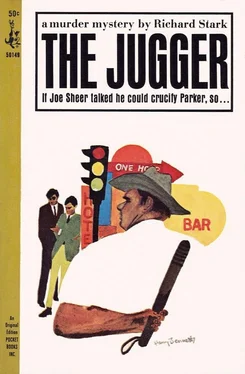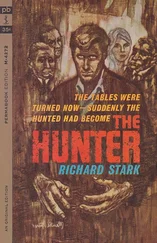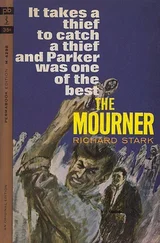Parker stood in the main entrance a minute, getting used to the dimness after the bright sunshine of the street. The room was hollow, muffled, empty of people, with no one standing next to the door near the podium containing the book for visitors to sign, and no one sitting on the maroon mohair sofas in the corner alcoves.
Parker shut the front door and started across the room, his passage making no sound at all on the thick carpet.
Going through the curtained doorway at the far end of the room was like time travel, like leaping across the years out of the muffled darkness of the Victorian era and into the plane geometry of the age of IBM. The walls of this corridor, painted grey, looked like some sort of spackled plastic in a poor imitation of stucco; the ceiling was a gridwork of white sound-proofing panels with small black holes in rows; and the floor was black composition that deadened the sound of Parker’s feet almost as much as the maroon rug had in the other room.
Midway along the corridor two white doors faced one another. Parker tried the one on the left and saw a flight of stairs leading down to darkness. The door on the right was better; it led to a small office done in the same IBM style as the corridor, but with old-fashioned glass-fronted bookcases flanking the window.
The office, too, was empty. Parker stepped through the doorway and looked around. There was no paper in the electric typewriter on the side desk, nothing disrupting the bare neatness of the main desk, no coat or hat on the coatrack in the corner. The place looked like a fake office in some furniture company’s display room.
He turned around to go back out to the hall, and the doorway was suddenly filled by a chunky aggrieved-looking type in a tight black suit, a chauffeur’s cap, and grey cloth gloves. He stared at Parker from under bunched eyebrows and said, “What you doing in there?”
“Looking for Gliffe.”
“What?”
“Bernard Gliffe. He runs this place, he’s your boss.”
“I know who Mr. Gliffe is.”
“You know where he is?”
He still looked aggrieved, but not at Parker, more as though it was his normal expression, as though the injustice that had been done him had cut so deep he’d never lose the scar, even though it had happened so long ago, he couldn’t really remember what it was anymore. He nodded and said, “Sure I know where he is.”
“Where?”
“Upstairs taking his nap.”
“His what?”
“Whenever we got a morning job out to Greenlawn, he takes a nap afterwards. You want him for something special?”
Parker said, “I want to talk to him about Joseph Shardin.”
“Who?”
“You buried him this morning,” Parker told him. “He was the morning job out to Greenlawn.”
“Oh. Oh, him.” He shook his head. “I never know the name of the stiffs,” he said. “Unless it’s my own family or something, that’s different.”
“You want to get Gliffe?”
“Yeah, okay. You can’t wait in there, you got to wait out in the viewing-room.”
“The what?”
He meant the room Parker had already gone through, with the flowers and the bier. Parker waited in there five minutes, pacing up and down on the maroon carpet. He wondered if Tiftus was awake yet, if Captain Younger had discovered yet that Parker was no longer in the hotel. He didn’t know how much time he had.
Gliffe at last came through the draperies at the far end of the room, like an apologetic Sydney Greenstreet. He was an extremely tall, somewhat heavy-set man, with sloping shoulders and broad beam and flat-footed stance. He was about fifty, black hair turning grey at the temples the way it was supposed to, face pallid as bread dough and jowly as a squirrel. His eyes were pale blue, watery, slightly protuberant beneath skimpy eyebrows; at the moment they were blinking away sleep. He was wearing a black suit and black tie.
He came forward as improbably light as a Macy’s parade balloon, his dead-fish hand extended. “I am Bernard Gliffe,” he said. “You are...”
For Gliffe, Parker put on his businessman face. He shook Gliffe’s hand and said, “Willis. Charles Willis.” It was the name he’d used before on trips to this town, so he was using it this time, too. The way he said the name, he had to be a businessman of some kind. The way he looked, big and square and hard, it had to be a tough and competitive business; used cars maybe, or jukeboxes.
Gliffe said, “A friend of Mr. Shardin’s, Benny tells me.” His eyes glittered just a little when he said Joe’s name.
Parker said, “That’s right. That’s why I’m here.”
“Come into the office. We can sit down and chat.”
The chauffeur — Benny, apparently — was nowhere in sight. Parker followed Gliffe down the hall and back into the office, and Gliffe eased around and settled into the chair behind the main desk like a dirigible mooring. Parker sat in the client chair behind the desk.
Gliffe said, “A sad thing about Mr. Shardin. Sad indeed.” It was just words, a conversation-filler.
Parker said, “The paper didn’t have much to say about how he died.”
“A heart attack, I believe. You knew Mr. Shardin well?” Again there was that touch of excitement in his eyes, quickly covered.
“Since before he retired,” Parker said.
“Ah.” Gliffe nodded solemnly, eyes hooded, and formed a little tent with his hands on the desk, fingertips together. “I never met Mr. Shardin in life,” he said. “A recent resident in our community.” His tone was supposed to inspire confidence, information.
But information was what Parker wanted. He said, “You never knew him?”
“No, I’m sorry to say I did not. A very pleasant and agreeable man, from all accounts.”
“How come you got the job?”
Gliffe looked slightly offended for just a second, but then it was gone and he said, “As there were no known living relatives, it fell upon the municipality to make the arrangements for burial, and the assignment devolved upon me.” He spread his hands as though to say that death is terrible but inevitable and someone must perform these sad duties. Then he brightened and said, “Do you come from Mr. Shardin’s home town?”
“No, we were in the same business awhile. Who’s handling the estate?”
“The Citizen’s Trust, I believe. Yes, Citizen’s Trust. Mr. Shardin had an account there and, as he died intestate, the court appointed the bank executor. So you were both in the same business, eh?”
“For a while.” Gliffe’s attempts to pump for information were surprising in their strength. Parker, brushing them off, still wondered about them; Gliffe shouldn’t be that interested in someone he’d never known alive.
Before Gliffe could ask his next question, Parker said, “Who was his doctor?”
“His doctor?” Gliffe seemed puzzled. “I believe it was Dr. Rayborn. Why, what makes you ask?”
“I thought I might go see him. I’d been out of touch with Joe; I’d like to know what happened to him.”
“Well, of course, age must come to us all eventually, and Mr. Shardin was not a young man; seventy-one years of age, I believe.”
“Something like that.”
“He had led a full life,” he said, as though all that Joe’s life had lacked till now was Gliffe’s mouthing this little epitaph, “and, I trust, a happy one. But you would know more about that than I.”
“He had a happy life. Where is this Dr. Rayborn?”
“His office is just a block from here, west on Lake Avenue. Though, to be perfectly frank with you, Mr. Willis, I don’t understand your desire to see him. Mr. Shardin is gone; nothing any of us can do will bring him back.”
“I don’t want to bring him back. I want to hear about how he died.”
Читать дальше












